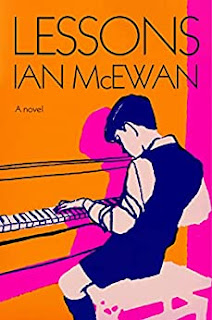Lessons by Ian McEwan: A review
Lessons, both learned and missed, are the foundations of life and history. In his latest book, Ian McEwan explores those foundations through the life story of his protagonist, Roland Baines. The story takes place during the mid-to-late twentieth and early twenty-first centuries in England. It is a long book, close to 500 pages and it is deserving of a thoughtful read.
We meet Roland as a child. His father is in the army, stationed in Libya. Roland is sent 2,000 miles away from his family to an English boarding school. There he has "lessons" with piano teacher Miss Miriam Cornell, but the lessons aren't only about the piano. Not to put too fine a point on it, Miss Miriam seduces her vulnerable young student. The affair, if we can dare call it that, scarred Roland for life.
Fast forward to April 1986 and we find the grown-up Roland married to Alissa. They have a seven-month-old son named Lawrence. As the novel begins, Alissa has just left Roland and her son. There was no warning or explanation and just like that Roland finds himself to be the sole carer for Lawrence.
Roland's and Lawrence's story is essentially the story of European history from the mid-twentieth century to the present. We get the aftermath of World War II and the Cold War, the Cuban missile crisis, the Berlin Wall's rise and fall, Chernobyl, 9/11, Brexit, and on and on right up to our current pandemic.
McEwan shows us the societal norms and culture of each period in that entire era. His great talent as a writer is the ability to depict the utter humanity of his characters, both their strengths and weaknesses, as they attempt to make sense of things and to live their lives in the best way they can. We can see how each action, each decision they make along the way leads inevitably to the next event.
Reading this book really brought home to me what a rich and colorful period of history Roland and I have lived through. Roland was haunted by the missed opportunities of his life, as many of us probably are. We seek to console ourselves in various ways but the ultimate question is, can we actually control the course of our lives? Or are we, in fact, simply riders of the storm, tossed whichever way the wind blows us? And in the end, does it really matter? Can we, in fact, learn from the "lessons" of our lives?

Interesting piano teacher!
ReplyDeleteShe was indeed.
DeleteThat's a lot of history covered in this one. And poor Roland! This is not the book for me, but I'm glad you enjoyed it.
ReplyDeleteI did enjoy it, but if you don't think you would, why waste time with it?!
DeleteI love most of his novels, so I am looking forward to this one. You make it sound very good & I like how you end your review - thought-provoking. I didn't realize there is much history & current events in the novel -- which is always enjoyable. But are novels getting longer these days, lol. Merry Christmas.
ReplyDeleteThank you for sharing your thoughts about this book. It sounds intriguing and poignant and thoughtful.
ReplyDeleteIan McEwan does "poignant" and "thoughtful" exceptionally well.
DeleteSounds like a good read. Ian McEwan does write thought provoking reads. I've read at least one of his novels, maybe two, but I wasn't overly wowed by what I'd read. Maybe I should give this novel a try.
ReplyDeleteI think you might like it, CR.
Delete